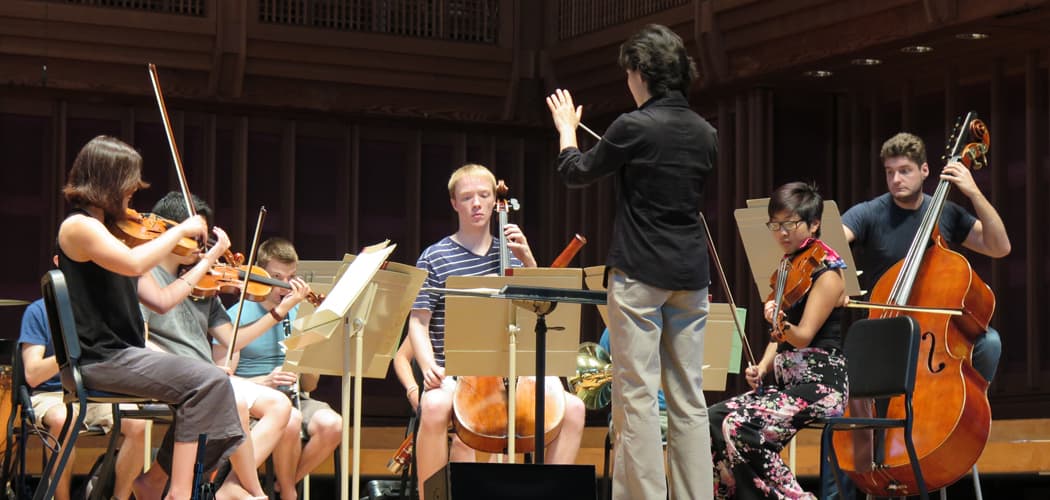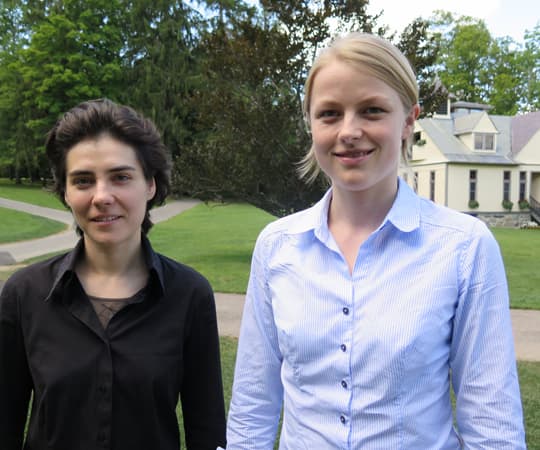Advertisement
A First For The Tanglewood Music Center: Both Conducting Fellows Aren’t Fellows
Resume
For 75 years the Tanglewood Music Center (TMC) in Lenox has been hosting an intense, summer-long academy for about 150 rising, young instrumentalists, composers and conductors.
And this year marks another milestone for the school: For the first time in the TMC’s history, its two conducting fellows aren’t fellows.
“The first conducting fellow was a guy named Leonard Bernstein,” Boston Symphony Orchestra Managing Director Mark Volpe reminded me on a sun-drenched afternoon in Lenox. “He was followed by Seiji Ozawa, Zubin Mehta and all these other famous guys — and I say guys."
But this year, the two maestros who’ve been studying, rehearsing and performing on the lush campus for the past eight weeks are Marzena Diakun and Ruth Reinhardt.
“To me, personally, as a father of two daughters, I’m absolutely delighted,” Volpe gushed. “And it took us 75 years to get to this point!”
For Volpe this milestone confirms an ongoing gender shift in the classical music world.
“When I first got into the business-30 plus years ago, and you put a woman on the podium, there’d be lots of grumbling from men in the back, and sometimes even in the front,” he recalled.

No one grumbles during conducting fellow Diakun’s rehearsal of an operatic piece by composer Benjamin Britten. On stage the young musicians watch her every move intently.
“It’s a very difficult job -- for a man and a woman,” Diakun told me.
The 34-year-old grew up in Poland, where her parents exposed her to the philharmonic. She played and performed piano from a young age, but became fascinated by the people she’d see at the podium. Her older brother noticed the conductor’s gleam in her eye and supplied her with symphonic recordings and a baton.
“It was my dream, actually, but a very secret dream,” Diakun said. “Even to my parents, I think when I was 18, then they realized that something is going in that direction.”
Diakun set her sights on pursuing a conducting career. She passed a rigorous exam and went on to study in Poland and Vienna. Along the way Diakun has earned prestigious prizes and high-level assistantships.
For her the entire orchestra playing together — as one — is the most beautiful instrument of all.
“It’s magic for me,” she said, then quickly qualified her thought with a laugh, “when it works!”
But it can also be tough sometimes, Diakun admitted, because she has encountered a double standard for women conductors — especially in Europe, which can be tightly locked in tradition. “We have to be much better to be judged in the same level as men,” she said.
“I don’t mind what they are as long as they’re good,” Stephan Asbury told me. He coordinates the TMC’s conducting program and helped select this year’s two fellows from a pool of 142 applicants.
When asked why they rose to the top Asbury listed off a few reasons: “They had skills, they had authority, they had conviction about their music making, they had ability, they were convincing as conductors."
Asbury also said Daikun was passionate in her audition video.
“She does have a very vivid technique. Very clear, very strong. Not brittle. But there’s a real fluency there in what she can do,” he described. “And also a strong personality.”
Then there’s the other conducting fellow, 27 year-old Reinhardt of Germany. Asbury recalled her audition footage, too.
“She’s very elegant in the way she makes music with people,” he said. “And I remember a particular moment in her Brahms 4. I think the whole table thought it was rather beautiful. And that’s what it takes sometimes, just a moment that really captures your imagination.”
The conducting bug bit Reinhardt -- by accident — when she was a teen.
“I was playing oboe in this youth orchestra in France," she said, "and I just had a terrible cold, so I asked the conductor if it would be OK if I didn’t play for one day, and he said, ‘Yeah, do you want to conduct?' ”
Reinhart’s reply was, “Well, why not?”
Now, after years of diligent study and performance, she’s currently finishing her master's of music degree in conducting at the Julliard School in New York. She was also chosen to be a conducting fellow with the Seattle Symphony for the 2015-'16 season.
But like her fellow fellow, Reinhardt says being a woman in what historically has been a man’s field can be tough. For one, people comment on her appearance more than they do on male maestros.
“Oh yeah, definitely," Reinhardt said. "Nobody would comment on what clothes male conductors wear. Or if they kind of put on some weight or something like that, and maybe their jacket is a little bit too tight. But if that happens to me as a female then that’s immediately pointed out.
“So I just stopped caring," she added.
But being at Tanglewood for the summer is an honor and a thrill for Reinhardt. She’s working with some of the world’s top young orchestral musicians, and gets to meet rock star conductors and performers who pass through the campus.
“It’s great to see them so casually walk into your rehearsal and say hi,” she said, smiling. “Yo-Yo Ma was just in my last concert.”
'If Someone's Good, They're Good'
Tanglewood has a strong history of championing women conductors, according to TMC director Ellen Highstein.
“It’s not a political statement, it’s a musical statement,” she said, and then echoed Asbury: “If someone’s good, they’re good. And we don’t in any way have to apply some kind of affirmative action standard because the women who apply are as good as the men.”
Highstein also says there are more young female conductors than ever before in the classical world, and she likes to think Tanglewood is doing its part to support them.
“The women we’ve had as fellows over the past I would say five to 10 years have all gotten jobs. They’re going on to assistant conductorships in larger orchestras, or they’re going to smaller orchestras where they are music directors. So it is happening,” she said.
"It’s happening slowly, but it’s happening.”
Highstein points to TMC alum Marin Alsop, maestra of the Baltimore Symphony Orchestra, as a pioneer, and a female role model.
While Reinhart and Diakun didn’t have any of those when they were coming up, this year Tanglewood is turning out two more.
The TMC fellows’ final concert is Sunday at 10 a.m. in Lenox.


